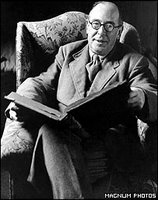 CS Lewis was an atheist in his youth. He described himself as being "very angry with God for not existing." He was later influenced by arguments with his Oxford colleague and Catholic friend J. R. R. Tolkien, and by G.K. Chesterton's book, The Everlasting Man. He slowly rediscovered Christianity. He came to believe in the existence of God although he fought greatly against it. He describes his last struggle in Surprised by Joy:
CS Lewis was an atheist in his youth. He described himself as being "very angry with God for not existing." He was later influenced by arguments with his Oxford colleague and Catholic friend J. R. R. Tolkien, and by G.K. Chesterton's book, The Everlasting Man. He slowly rediscovered Christianity. He came to believe in the existence of God although he fought greatly against it. He describes his last struggle in Surprised by Joy:You must picture me alone in that room in Magdalen, night after night, feeling, whenever my mind lifted even for a second from my work, the steady, unrelenting approach of Him whom I so earnestly desired not to meet. That which I greatly feared had at last come upon me. In the Trinity Term of 1929 I gave in, and admitted that God was God, and knelt and prayed: perhaps, that night, the most dejected and reluctant convert in all England.It sounds incredibly similar both in feeling and action. God wanted me to hit bottom. Not for him, but so I would see Him. I had been blind and deaf, stupid and ignorant.
My best friend told me of her similar experience and I relate her advice, and my 'awakening' with these words, 'I was trying to find myself by looking to the core of my humanity. I was looking in the wrong place. There is fault in being human. It is the Divinity within me that I must listen to, trust completely."